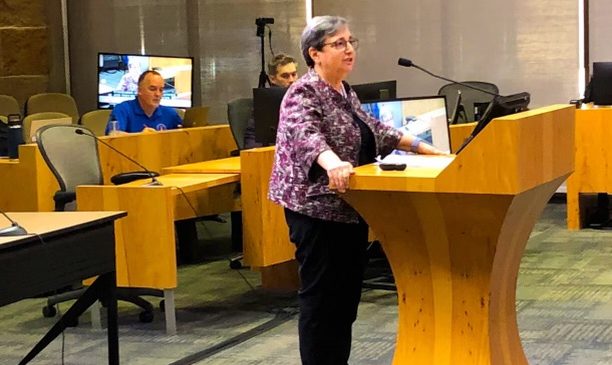Photo by Jo Clifton. UT professor Lynn Katz addresses the Audit and Finance Committee.
Austin Water making progress but needs more employees
Thursday, January 19, 2023 by
Jo Clifton Members of City Council’s Audit and Finance Committee have reviewed the findings of a report detailing problems during four significant events at Austin Water’s Ullrich Water Treatment Plant between 2018 and February 2022, including three boil-water notices and a zebra mussel infestation. The utility has addressed many of those problems and is in the process of addressing others, according to University of Texas professor Lynn Katz, who led the team at UT’s Center for Water and the Environment.
Council Member Alison Alter, who chairs the committee, said on Wednesday, “The release of this report is an important step towards rebuilding trust between our community and our utility, and it is crucial that we remain transparent as we implement the report recommendations. My hope is that our utility will embrace new approaches to stewarding our resources and managing our emergency response systems.”
The report “identifies 53 recommendations to strengthen Austin Water in the areas of hiring and compensation, organizational structure, operations and staff training, culture and internal communications, and emergency management,” Alter said, noting that the utility agrees, either completely or partially, with 49 of the 53 recommendations and has developed a plan to implement them.
After the meeting, Alter told the Austin Monitor that other city departments – and upper management – could learn a few things by studying the recently released report.
“I think the first step is making sure that senior leadership across the whole organization is taking a look at some of the recommendations,” she said, whether their department has anything to do with water or not, “so that we can look systemically and not have to reinvent the wheel in every department so that we can solve the challenges that are identified.”
Katz told the committee that the water utility had made significant progress in responding to after-action reports related to the four incidents. She said there was no single cause for the troubles at the utility, but called the problems “a series of cascading issues.” Although Austin Water failed to take appropriate action to head off problems with zebra mussels in spite of warnings, Katz said the utility was doing a good job battling cyanotoxins, the bacteria produced by blue-green algae that has sickened and killed several dogs in Austin.
One of the most salient recommendations not yet addressed is assigning overall management of the Ullrich plant to a single individual, Katz said. She said there also needs to be a greater emphasis on team building and additional training for the plant’s staff.
One of the recommendations that Council may reject is to have the leader of Austin Water report directly to the city manager. Alter pointed out that Austin Water’s director was reporting directly to the city manager at the time of each of the water plant’s problems.
Following the February 2022 boil-water notice, the water utility’s director, Greg Meszaros, resigned. Robert Goode, who has served in numerous positions of authority throughout his tenure with the city, was interim director until earlier this month, when City Manager Spencer Cronk appointed Shay Ralls Roalson as director. Goode has been pressed into service once again and will continue working for the city as an assistant city manager.
Council Member Leslie Pool implied that some members of the workforce had intentionally caused a problem at Ullrich. Members of the utility staff denied the allegation when asked about it after the meeting and Katz refused to address the question. But she said the utility has an aging workforce, maintenance is deferred longer than it should be and there needs to be a concerted effort to attract more employees.
Like many other departments in the city and water utilities across the country, Austin Water is in need of more staff. The utility has a 30 percent vacancy rate. Council Member Vanessa Fuentes wanted to know how the city could address that issue. Roalson told her the utility has been hosting meet-and-greet opportunities, has done a salary study and has submitted plans to Human Resources for changes.
Council Member Mackenzie Kelly asked whether Council’s decision to raise the minimum city wage to $20 an hour had had any unintended consequences. Roalson said the change has created some frustration on the part of staff members who have been there a long time to have new employees come in at a salary close to theirs. She said they were working to address the issue.
In addition to the report this month, water utility leaders will appear again next month at a joint meeting of the Audit and Finance and Water Oversight committees.
The Austin Monitor’s work is made possible by donations from the community. Though our reporting covers donors from time to time, we are careful to keep business and editorial efforts separate while maintaining transparency. A complete list of donors is available here, and our code of ethics is explained here.
You're a community leader
And we’re honored you look to us for serious, in-depth news. You know a strong community needs local and dedicated watchdog reporting. We’re here for you and that won’t change. Now will you take the powerful next step and support our nonprofit news organization?






